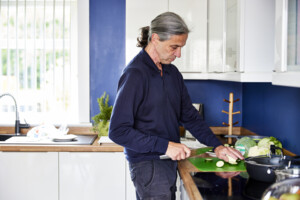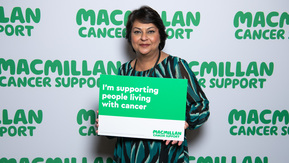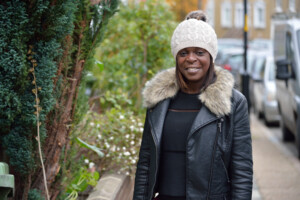Meet Nes
Living with inoperable cancer is a journey with uncertainty and questions. But it is also a journey that can have moments of joy and resilience. In this interview, Macmillan Digital Editor Ros speaks with Nes, who shares her story.
Why did you want to share your experiences?
I've been involved with Macmillan for a few years since I was diagnosed, and I've met many people with cancer or volunteering. They are ordinary people doing extraordinary things.
I want people to see that you don't have to do something grand to make a difference. You can be an ordinary person, living a happy life, and then suddenly, cancer hits you.
Cancer changes your life, but it doesn't have to be all bad. Lots of good things can come out of it, and you can still do great things with your life.
Why is hope important?
Living with hope in a positive way makes such a difference. Meeting someone in the street, smiling, and chatting can make you feel really good. Living with cancer is the same. It's about finding those moments of positivity and holding onto them.
How did your diagnosis during lockdown affect you?
It was traumatic. I remember my first appointment after the mammogram. The nurse and consultant asked why my husband wasn't with me. I said I was told to come alone. They let him join by loudspeaker. When I was told I had primary breast cancer, it was a shock.
Two weeks later, I found out it had spread to my bones and liver, making my cancer terminal. It was hard to process, especially during lockdown.
How did you cope emotionally?
It was tough. I went through chemo, which was brutal. I had to find ways to stay positive.
By the end of 2021, I decided to retire from my full-time job. I started working part-time at a local golf club, which brought a new community and fitness into my life. It forced me to reevaluate my life in a good way.
What role has exercise played?
Exercise has made a massive difference. I didn't do Pilates before cancer, but a Macmillan nurse recommended it. I found it incredibly beneficial for my body and mind.
Swimming has always been my thing, it helps me stretch, breathe, and feel good. I now swim four to five times a week.
I believe exercise should be prescribed for people with cancer. It’s not just about medication, it is about finding activities that make you feel good.
I would urge anyone to find their thing exercise-wise, no matter what it is, try it and enjoy it.





